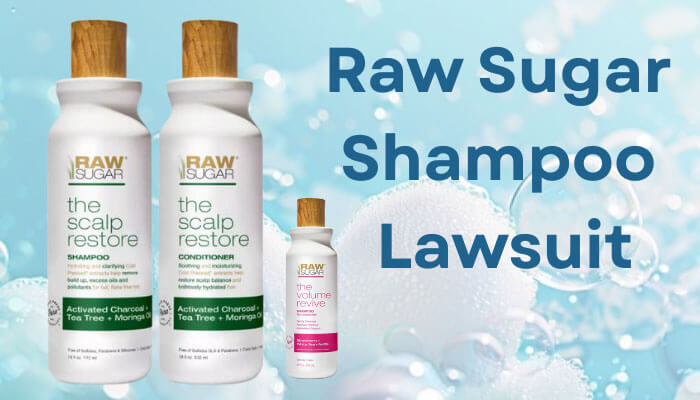Few businesses that promote themselves as “natural” and “plant-based” are subject to intense scrutiny in the age of clean beauty and conscious consumerism. A company named Raw Sugar, which is well-known for its shampoos and conditioners and is currently facing legal action. The lawsuit against Raw Sugar has important issues of product safety, corporate responsibility, and false advertising. This article provides you with detailed information on the Raw Sugar Shampoo lawsuit.
Origin Of Raw Sugar And Its Promises:
Before knowing about the Raw Sugar Shampoo lawsuit, it is important to know about its brand. Raw Sugar markets itself as an authority on clean and natural beauty. The company obtained a large following for customers who were looking for better, healthier solutions, especially for products that were not tested on animals.
Raw Sugar alleges to use only plant-based ingredients and to have eco-friendly packaging. The brand’s success can be largely attributed to its ability to tap into the growing demand for “natural” and “clean” beauty products. Raw Sugar’s promise of using simple, well-known ingredients has significantly attracted customers.
What is a Raw Sugar Shampoo Lawsuit?
The allegations that the company misled customers about the nature of its products are the basis of the Raw Sugar Shampoo lawsuit. The plaintiffs allege that the company advertised its shampoos as natural and plant-based, the ingredients include potentially harmful synthetic materials. The Raw Sugar Shampoo lawsuit is based on a contradiction between the product’s ingredients and the claims made in the advertisements.
A number of customer protection laws have been violated in the Raw Sugar Shampoo lawsuit. The purpose of laws is to protect consumers from misleading or false advertising. The plaintiffs further contend that Raw Sugar’s marketing misled them into believing that only natural ingredients were being used.
Allegations of Raw Sugar Shampoo Lawsuit:
The inclusion of synthetic ingredients is one of the primary issues that led to the Raw Sugar Shampoo lawsuit, as it contradicts the brand’s promises.
In the Raw Sugar Shampoo lawsuit, plaintiffs allege that the shampoo formulations are very far from the “plant-powered clean” that is promised by the brand. These findings made evident that these products include substances that some consumers are actively trying to avoid.
The Raw Sugar Shampoo Lawsuit highlights a need for ingredient labeling. Customers who choose natural products over chemicals may have unknowingly used their products which did not reflect their values or preferences because of the claimed ingredient misrepresentation
Impacts on Customers:
The Raw Sugar Shampoo lawsuit offers an opportunity to take care when responding to advertising claims and to carefully consider product ingredients particularly those associated with wellness and beauty. Customers will need to be more proactive by considering the ingredients they use and the real significance of the many certifications.
Additionally, a potential lack of trust between a brand and its customers is revealed by this Raw Sugar Shampoo lawsuit. This may result in a loss of confidence, when companies have misled their customers.
Industry-Wide Impact:
The Raw Sugar Shampoo lawsuit is not the first of its kind. Similar legal action has also been taken against other brands in the natural and clean beauty space. The necessity of complying with current legislation and industry standards is well demonstrated by these lawsuits. This could serve as an impetus for the changes in how companies market their products.
Conclusion:
The Raw Sugar Shampoo lawsuit serves as a cautionary tale for both customers and the whole cosmetics industry. In marketing and product formulation, it emphasizes a high value on transparency, honesty, and accountability. Customers should always be on alert for the products they use.
Customer confidence may have been impacted by the Raw Sugar Shampoo lawsuit, but it also encourages opportunities for positive change. By pushing for defined standards and clearer labeling, we get one step closer to a beauty industry that genuinely cares for the health and welfare of its customers. It is important for the customer to protect themselves from products that contain harmful ingredients, or misleading advertising.
FAQs:
Q1. What is a Raw Sugar Shampoo Lawsuit?
Ans. The lawsuit claims that Raw Sugar Shampoo engaged in misleading and false advertising, and it may result in hair loss, scalp inflammation, and other adverse effects.
Q2. Why was a lawsuit filed against the Raw Sugar Shampoo?
Ans. A class-action lawsuit was filed against Raw Sugar Shampoo because of not disclosing the potential hazards even after the customers had complained about the adverse side effects like hair thinning and scalp issues.
Q3. Are the ingredients of Raw Sugar Shampoo harmful?
Ans. Some ingredients such as fragrances and sulfates may cause irritation or allergic reactions in sensitive individuals and these are some of the concerns raised in lawsuits.
Q4. Is it still safe to use Raw Sugar Shampoo?
Ans. While not all users report issues, few have experienced adverse effects. It is more advisable to do patch tests for the product before use and if you experience any of the side effects then you must consult a healthcare professional.
